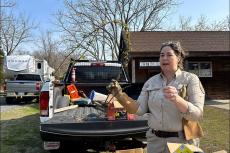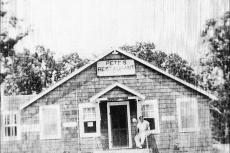Concerned Citizens of Montauk announced this week that it has retained Christopher Gobler of Stony Brook University’s School of Marine and Atmospheric Sciences to assess Montauk’s wastewater issues.
The announcement follows the Suffolk County Parks Commission trustees’ unanimous vote to reject a land swap with East Hampton Town, scuttling a town board proposal to build a sewage treatment plant in the Hither Woods, which drew strident opposition from some residents.
Dr. Gobler is the director of the New York State Center for Clean Water Technology at Stony Brook University. He has done 20 years of research focusing on how excessive nitrogen loading affects water quality, has been monitoring waterways under town trustee jurisdiction for the last decade, and does the same on C.C.O.M.’s behalf in Montauk. He briefed the trustees on Monday about shellfish beds on the East End that have been temporarily closed due to a neurotoxin. That is covered separately in this issue of The Star.
In collaboration with C.C.O.M.’s environmental team, Dr. Gobler will investigate Montauk’s wastewater issue using the best science and data currently available, according to a statement from the group. “We have been working with Dr. Gobler to monitor harmful algal blooms in Fort Pond for the past six years and we are thrilled to begin examining Montauk’s wastewater issue with him,” Jaime LeDuc, a C.C.O.M. program specialist, said in the group’s statement issued on Tuesday. “He is one of the most influential scientists in the nation for this type of work.”
“I am excited to expand this collaboration by closely examining approaches and policy options that will best protect Montauk’s most precious resource, its water,” Dr. Gobler said in the same statement.
The effort is to advance C.C.O.M.’s goal of gathering information to help assess whether the environmental benefits of the town’s wastewater proposal would outweigh potential harm. The group questioned the town board’s plan, which involved a November 2022 acquisition of 18.8 acres of vacant land on East Lake Drive with general municipal funds, and not community preservation fund money as initially intended. That move drew suspicion that the land would be swapped with the county for Hither Woods property on which a wastewater treatment plant would be sited.
While the group says it is committed to helping to create a comprehensive wastewater plan for the hamlet, “As an organization established to preserve open space, C.C.O.M. is in principle opposed to the alienation of parkland,” it wrote on its website. “The bar is very high for C.C.O.M. to consider alienation to ever be appropriate — it must result in a demonstrable and viable environmental benefit, and it must address environmental harm that cannot be mediated in any other way, a standard that has not yet been met.” The group also questioned the proposal’s scope and funding, and expressed concern that it would facilitate more development and greater density in the hamlet’s downtown.
Prior to the Parks Commission vote to reject a land swap, the town was discussing preliminary plans for a centralized wastewater treatment plant designed initially to accommodate a downtown sewer district but with the potential for expansion to include the docks area, the vicinity of the hamlet’s Long Island Rail Road station, and Ditch Plain.
The town, according to a Feb. 24 statement, “will continue to seek solutions to the ongoing wastewater problem in Montauk, where inadequate individual septic systems on properties in areas such as the downtown business district result in a release of raw sewage that exceeds Health Department standards.”




